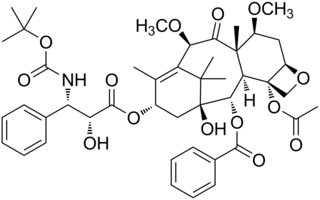
Cetuximab, sold under the brand name Erbitux, is an epidermal growth factor receptor (EGFR) inhibitor medication used for the treatment of metastatic colorectal cancer and head and neck cancer. Cetuximab is a chimeric (mouse/human) monoclonal antibody given by intravenous infusion.

Genzyme was an American biotechnology company based in Cambridge, Massachusetts. Since its acquisition in 2011, Genzyme has been a fully owned subsidiary of Sanofi. In 2010, Genzyme was the world’s third-largest biotechnology company, employing more than 11,000 people around the world. As a subsidiary of Sanofi, Genzyme has a presence in approximately 65 countries, including 17 manufacturing facilities and 9 genetic-testing laboratories. Its products are also sold in 90 countries. In 2007, Genzyme generated $3.8 billion in revenue with more than 25 products on the market. In 2006 and 2007, Genzyme was named one of Fortune magazine’s “100 Best Companies to Work for”. The company donated $83 million worth of products worldwide; in 2006, it made $11 million in cash donations. In 2005, Genzyme was awarded the National Medal of Technology, the highest level of honor awarded by the president of the United States to America’s leading innovators. In February 2022, Sanofi's new corporate brand was unveiled and former entity "Sanofi Genzyme" got integrated into Sanofi.

Tipifarnib is a farnesyltransferase inhibitor. Farnesyltransferase inhibitors block the activity of the farnesyltransferase enzyme by inhibiting prenylation of the CAAX tail motif, which ultimately prevents Ras from binding to the membrane, rendering it inactive.
Metelimumab (CAT-192) is a human IgG4 monoclonal antibody that neutralizes TGF beta 1 which had been chosen for further development for the treatment of diffuse cutaneous systemic sclerosis, also known as scleroderma. It was dropped from further development in favour of fresolimumab, which was being developed by Genzyme as of 2006.
Lucatumumab is a human monoclonal antibody against CD40 development of which was discontinued by Novartis in 2013 after it was investigated for the treatment of various types of cancer like multiple myeloma and follicular lymphoma.

Nelivaptan (INN) is a selective, orally active, non-peptide vasopressin receptor antagonist selective for the V1B subtype. The drug had entered clinical trials for treatment of anxiety and depression. In July 2008, Sanofi-Aventis announced that further development of this drug had been halted.
Tigatuzumab (CS-1008) is a monoclonal antibody for the treatment of cancer. As of October 2009, a clinical trial for the treatment of pancreatic cancer, Phase II trials for colorectal cancer, non-small cell lung cancer, and ovarian cancer have been completed.

Cambridge Antibody Technology was a biotechnology company headquartered in Cambridge, England, United Kingdom. Its core focus was on antibody therapeutics, primarily using Phage Display and Ribosome Display technology.

Iniparib was a drug candidate for cancer treatment. It was originally believed to act as an irreversible inhibitor of PARP1 and possibly other enzymes through covalent modification, but its effects against PARP were later disproven. It underwent clinical trials for treatment of some types of breast cancer, but was discontinued after disappointing phase III clinical trials.
Glembatumumab vedotin is an antibody-drug conjugate (ADC) that targets cancer cells expressing transmembrane glycoprotein NMB (GPNMB).

Cabazitaxel, sold under the brand name Jevtana, is a semi-synthetic derivative of a natural taxoid. It is a microtubule inhibitor, and the fourth taxane to be approved as a cancer therapy.
Carlumab is a discontinued human recombinant monoclonal antibody that targets human CC chemokine ligand 2 (CCL2)/monocyte chemoattractant protein (MCP1). Carlumab was under development for use in the treatment of oncology and immune indications and was studied for application in systemic sclerosis, atherosclerosis, diabetic nephropathy, liver fibrosis and type 2 diabetes.
Moxetumomab pasudotox, sold under the brand name Lumoxiti, is an anti-CD22 immunotoxin medication for the treatment of adults with relapsed or refractory hairy cell leukemia (HCL) who have received at least two prior systemic therapies, including treatment with a purine nucleoside analog. Moxetumomab pasudotox is a CD22-directed cytotoxin and is the first of this type of treatment for adults with HCL. The drug consists of the binding fragment (Fv) of an anti-CD22 antibody fused to a toxin called PE38. This toxin is a 38 kDa fragment of Pseudomonas exotoxin A.

Tralokinumab sold under the brand names Adtralza (EU/UK) and Adbry (US) among others, is a human monoclonal antibody used for the treatment of atopic dermatitis. Tralokinumab targets the cytokine interleukin 13.
Dupilumab, sold under the brand name Dupixent, is a monoclonal antibody blocking interleukin 4 and interleukin 13, used for allergic diseases such as eczema, asthma and nasal polyps which result in chronic sinusitis. It is also used for the treatment of eosinophilic esophagitis and prurigo nodularis.
Lirilumab (INN) is a human monoclonal antibody designed for the treatment of cancer. It binds to KIR2DL1/2L3.
Indusatumab vedotin (MLN-0264) is an antibody-drug conjugate that is under development for the treatment of pancreatic cancer and other gastrointestinal cancers. It consists of a monoclonal antibody (indusatumab) that targets the enzyme guanylate cyclase 2C which is present in some cancers, linked to an average of three to four molecules of the chemotherapeutic agent monomethyl auristatin E (MMAE).
Denintuzumab mafodotin is a humanized monoclonal antibody-drug conjugate designed for the treatment of CD19-positive acute lymphoblastic leukemia and B-cell non-Hodgkin lymphoma. It consists of an anti-CD19 mAb linked to monomethyl auristatin F (MMAF), a cytotoxic agent. This drug was developed by Seattle Genetics.
Depatuxizumab mafodotin is an antibody-drug conjugate designed for the treatment of cancer. It is composed of an EGFR IGg1 monoclonal antibody (depatuxizumab) conjugated to the tubulin inhibitor monomethyl auristatin F via a stable maleimidocaproyl link.







